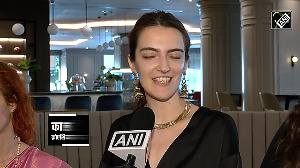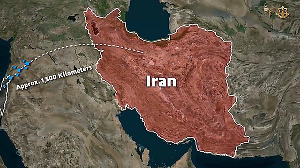A new entrant, whether a popular actor or not, has not been able to sweep the polls, as their fans had hoped for.
It should hold true for Vijay as well. Or, something drastically has to happen between now and 2026, asserts N Sathiya Moorthy.

To some, especially his hardcore fans, come assembly polls in 2026, and actor Vijay is the next best thing that can happen to 'Dravidian' Tamil Nadu.
To others, he is one more in the long queue of actors who want to make it big in politics, and use it as a peg to promote his career that is expected to sag with the passing of years and of star-fans, who too would have aged alongside.
But there is a difference -- and that is strikingly different from that of most others before him.
Vijay's film career is nowhere near sagging for him to need a political prop-up.
Two, and even more important, he is not looking at extending his career after completing his two ongoing cinematic projects, and intends completing them long before elections 2026.
Thus, there should be no complaints or criticism that possibly like 'superstar' Rajinikanth before him, Vijay is trying to prop up his career even before it hit the inevitable low patch.
Rajinikanth began doing it with his home production Valli in the early nineties, where he tested mouthing socially-relevant political messages, or politically-acclaimed social messages -- and took his famous 'one-liners' to a different level of fan moment and mass acceptance.
More importantly, in this era of pan-Indian cinema, wherein Rajini, the non-starter of a politician, made a huge box-office comeback with his Jailer (2023) and compatriot Kamal Haasan, otherwise a political lightweight, through Vikram (2022), there is nothing that Vijay, reportedly the highest-paid film actor in the Tamil film industry, has to fear.
His pan-India image has not been tested to be proved one way or the other, but his box-office acceptance level across south India has been proved time and again, over the past many years.

It is this decision of his, to quit films all at once to take an active and full-time interest in politics, that has caused people to raise eyebrows and take notice.
Supporters and sympathisers say that it speaks for his sincerity of purpose and dedication to the cause, which he seeks to promote through the political party, Tamizhaga Vetri Kazhagam (TVK), that he promoted and also got registered with the Election Commission, even before approaching the people.
That very day, he stated clearly that he would not field candidates for the Lok Sabha polls that was only months away but would do so only in the assembly elections in 2026.
What was equally welcome was his simultaneous announcement of quitting filmdom way before.
This was possibly to silence critics, who would have been tempted to draw parallels with Rajinikanth, who was talking politics, both in films and outside -- and yet chickened out at the last minute, citing health reasons in the months after the end of Covid.
That was also when Rajini officially confirmed that he had undergone a kidney transplant surgery some years ago, and was medically advised to take greater care than in the normal course.

Sure enough, no one mentioned Vijay and his TVK after the Lok Sabha polls, yes, but he kept himself in the news, by greeting Prime Minister Narendra D Modi on his re-election and Rahul Gandhi after his elevation as the Leader of the Opposition in Parliament.
The Kallakurichchi hooch tragedy has suddenly ended the ruling DMK combine's honeymoon with the voters after the successful Lok Sabha polls, and has also revived forgotten memories of the anti-incumbency factor from the pre-election months. It also has meant that the state is already on election mode for 2026.
It's all only for starters. Vijay made bigger news more recently, when for the second year in a row, he met with district toppers in 10th and 12th standard state board examinations, and gave away gifts and certificates.
The function is being held in two phases, owing to paucity of space in the huge convention centre that the TVK has hired this time, like the last time round. There was a difference. The TVK itself was born only during the interregnum.
At the end of the day, did Vijay talk politics to the invited students and their parents at the first of the two-phase function that alone has passed by? It is a million rupee question for media-persons, some of whom liken it to the 'confusing signals' that Rajini used to send across until he announced his retirement even before entering the fray.
Others are more charitable. As they point out, Vijay was addressing school students, all of them in their teens, and he had to be careful in not putting wrong ideas and priorities into their hearts, heads and minds. Thus, he asked them to focus first on their education, produce 'leaders' in every field, including politics, and stay off drugs and other vices of the kind.
Yet Vijay's declaration that Tamil Nadu has 'not produced sufficient number of good leaders' though 'there are world-class engineers and doctors' has sparked a debate or a controversy, so to say.
Though he quickly clarified that he was talking about 'leaders' in every field, hair-splitting social media activists asks if 'world-class doctors and engineers' are not leaders in those fields, what they are otherwise.
They tend to believe that Vijay was only talking about political leaders but did not want to spell it out lest he should be blamed for 'poisoning' young minds and paying for it by calling them to a honour function from across the state.
The less charitable criticism is that Vijay is looking beyond his current crop of fan followers to tap future/futuristic youth as his lieutenants all across the state -- hence his reference to 'leaders', including politics.

By election time in 2026, Vijay should have honoured three batches of district-toppers (the next one hopefully in 2025).
Those honoured for their Plus-2 marks would hopefully be in some professional course, the first batch from 2023 having completed their third year during election-time.
They need not have to go around sticking wall posters or blaring from microphones, marketing Vijay and the TVK.
After the Jallikattu protests, social media is the favourite campaign platform of political parties in the state, some like the BJP at the national level having excelled in it all since 2014 at the very least.
As much as their contributions in man-hours, if that is what is required, their very presence in their home-] localities could show up the TVK as something different with some people who want to make that difference.
Now, what are TVK's chances in 2026? By conventional wisdom, the party could garner much of the traditional 10-per cent voters-for-change, whatever that change be.
It has happened since the first general elections in the then Madras Presidency in 1952, but became more pronounced when the nascent DMK entered the election scene, five years hence, in 1957, in the linguistically-reorganised state of Madras, now Tamil Nadu.
From then on, this constituency, changing in demography with each passing election, has remained more or less consistent and determined.
Thus in the post-MGR assembly polls of 1989, his widow and failed chief ministerial successor, V N Janaki, mustered it alongside a political ally in Thespian actor, Sivaji Ganesan, with his equally failed electoral entity, which he too wound up, post-poll.
Likewise, in the first half of the nineties, they split between the nascent PMK and MDMK, and came together in the late G K Moopanar-led TMC combine, including two Dalit parties, in the second half.
In the next decade, much of these votes went to the late actor-politician Vijayakanth with his DMDK.

Today, those votes are believed to be with actor-politician Seeman's NTK. The natural/theoretical expectation is that these votes, or much of it, would migrate towards Vijay and TVK. However, questions are being asked if it would happen this way, as Seeman is seen as a 'pan-Tamil' leader with an organic constituency of its own.
But others argue that much of the 10-per cent voters who vote for the inevitable 'loser', is looking only for 'change', and many of them have already been voting for Seeman over the past two decades, and they too may want change.
Incidentally, these voters should not be confused with the conventional 'swing voters', who are not necessarily for 'change' as the 10 per cent but keep shifting between the ruling party and the Opposition -- incidentally, both of the Dravidian hue, thus far in 60 years.
Granting that the TVK garners a substantial share from this 10 per cent, and the 'feel-good' young voters from the school-leavers corps also chip in big-time, where does that leave the party, if it sticks to the decision to contest on its own?
Through his four decades of his acting career -- with a huge slack in for about a decade in between -- Vijay has won a massive fan following among women, particularly rural women. Will they vote for the TVK without further motivating elements?
For instance, the welfare schemes of the incumbent DMK government, comprising free bus ride, Rs 1.000 per month for women and now youth, both boys and girls, and free breakfast for elementary school children in government and aided schools are all a huge draw.
In fact, if the district-toppers whom Vijay and TVK are honouring now are already receiving the monthly assistance from the state government, where will their electoral loyalties lie -- with the DMK or the TVK, or with neither, or with another?
As past experience with and of new political parties has shown, a new entrant, whether a popular actor or not, has not been able to sweep the polls, as their supporters and fans had hoped for.
Given a proven pattern, it should hold true for Vijay and the TVK. Or, something drastically has to happen between now and 2026.
However, such new players, especially Vijayakanth, Kamal and Seeman, did not produce the kind of manifesto that made the difference and showed them up as much more than film actors with an interest in politics – and public service. Can Vijay make that difference, could be among the deciding factors.
For now, however, opinion is also divided that Vijay may after all consider an alliance with 'like-minded parties' that are willing to accept him as their chief ministerial candidate. That should leave out the DMK and the AIADMK, and possibly also the BJP.
The PMK too has to do some thinking, as in assembly elections, they have projected party president Anbumani Ramadoss as chief minister candidate, time and again.
The party, after drawing a huge blank in the BJP's company this time and otherwise earlier, may not want to risk joining another alliance, whose time might not have come -- or, whose time might never come, as insiders perceive it.
There are, of course, the likes of Seeman and the NTK, but the party may have to successfully live down its staunch pan-Tamil image if Vijay's non-fan supporters which the TVK hopes to attract, have to feel comfortable about.

As is known, the BJP was keen on leading an alliance now in the Lok Sabha polls and later in the assembly elections that it snapped ties with the existing AIADMK partner from 2019 and 2021 – though both failed, too.
It is another matter that state BJP leaders who have ridiculed Vijay for his Christian identity -- Vijay Joseph is his full name, as they were not tired of recalling, but not anymore -- may have to eat their words, if not outright apologise to his fans.
Yet, the six-plus per cent Christian voters, as per the last Census in 2011, is an attraction that may tempt the BJP, to try and expand its voter-base in Vijay's company in Tamil Nadu, just as it has won many of them in neighbouring Kerala without any such appendage or whatever. But the Christian constituency may not be tempted, or may not approve of any TVK alliance with the Hindutva party.
There is another six-minus Muslim population/vote-share from Census 2011, which may also be shaken, but if and only if Vijay goes on his own, and not certainly with the BJP.
A share from the substantial Dalit constituency is also what Vijay could be eyeing.
All of it aims at targeting the DMK and the ruling party's Congress ally in particular, as things stand now.
Some of the 'minorities and Dalit votes' that may return to the AIADMK camp if the party stays off the BJP in 2026, too, may still go the Vijay way. Or, that is one calculation.
That raises the question: By congratulating Rahul Gandhi, is Vijay wooing the Congress into a new alliance? After all, a decade or so ago, Vijay did meet Rahul in Delhi, and the speculation was that he was asked to join the party and lead the Tamil Nadu unit.
But today, the times are different, after three terms of Modi-led BJP-NDA government at the Centre. And so is politics in Tamil Nadu...
N Sathiya Moorthy, veteran journalist and author, is a Chennai-based policy analyst and political commentator.
Feature Presentation: Rajesh Alva/Rediff.com











